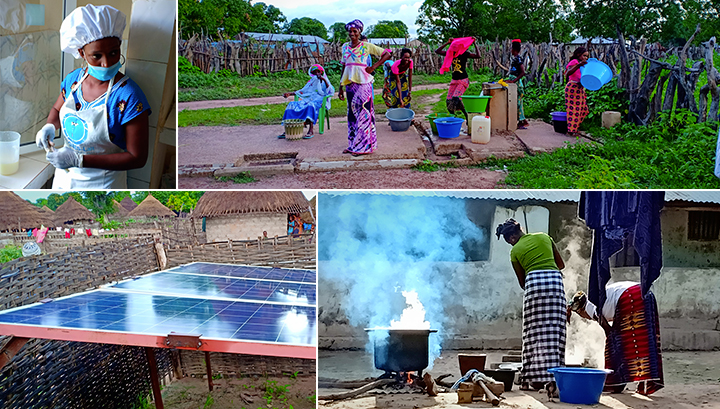Ensuring a constant supply of firewood is their job. Their other daily tasks include feeding the household, grinding grain and fetching clean water. Women and girls in West Africa are real powerhouses, performing colossal tasks to provide for their families, sometimes at the risk of their health.
Villages now have solar-powered water pumping systems, meaning that women no longer need to travel long distances to provide drinking water for their families.
Fortunately, more and more initiatives involving renewable sources of energy are being developed. These could significantly improve the living conditions of women as well as lightening their workload. A team of researchers from Burkina Faso and Senegal is delving into the heart of this energy transition to understand what drives communities to undertake this major transformation.
In West Africa, a family uses between 7 kg and 10 kg of wood per day for its domestic needs, i.e. about 3 tonnes of wood per year. In an area that is already heavily affected by desertification, this raw material is not always available or easily accessible. In addition, women inhale smoke from the cookstove all day long. Not to mention the increased risk of burns and fires.
However, all that was needed was to change the composition of traditional cookstoves to reduce wood consumption by 30% to 60% through better heat concentration. More and more households are adopting these improved fireplaces, especially since women can build them themselves using local materials.
On the outskirts of cities, sustainable mechanization initiatives have emerged, such as grain mills and water pumps. In Ngouye, for example, there are now mills powered by biofuel. The biofuel is produced from jatropha, a shrub whose oil-rich seeds are easily converted into fuel. Previously, women had to walk to a nearby town, sometimes a day’s walk away, to grind their crops. Others preferred to grind in the traditional way using a mortar, a very time-consuming method. This may seem like a small change, but it means that girls can now go to school.
Elsewhere, such as in Felane, it is the water supply that has been rejuvenated. Villages now have solar-powered water pumping systems, meaning that women no longer need to travel long distances to provide drinking water for their families.
The ProGREEN project focuses on the impacts of these local initiatives on gender equality and girls’ education. Launched by START and supported by the Fonds de recherche du Québec, the project aims to accelerate the energy transition by determining barriers and facilitators to the implementation of sustainable energy solutions.




